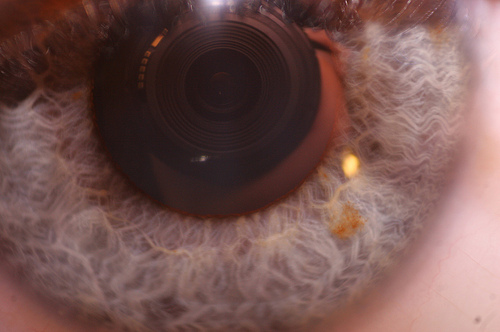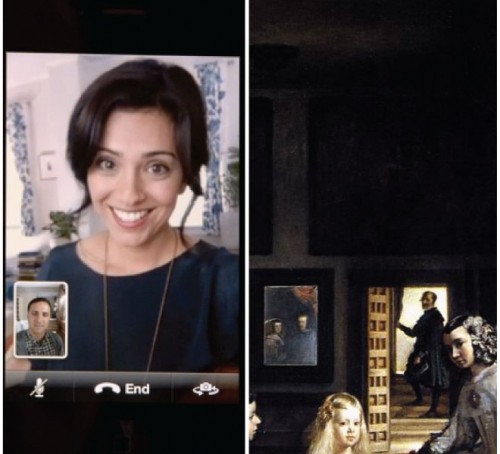Snapchat, the Opera

I take out my iPhone to start filming us in bed. Turned on my side, with my elbow bent to prop my head up with one of my hands, the other hand holding my phone. Through the screen I can see a close up shot of Adam’s nose and mouth. I pull back to see his entire face. I look beyond my phone to see his full body laying out in front of me. Adam starts to perform:
“Hi Lucy”
“What? [laughter] She’s not going to see this.”
“Isn’t this a Snapchat?”
“It’s not a Snapchat”
“You’ve been making Snapchats all morning and then you go and switch it up on me!”
“You can’t be so presumptuous”
“I’m hiding under here… For forever or until your battery runs out.”
“I brought my charger today”
“Ok, until your phone runs out of space.”
“My phone has unlimited space for embarrassing videos of you.”
“Oh my god… you’re adding this thing to our life. It’s like this wild animal. A barracuda.”
“I don’t understand. The camera’s a barracuda?”
“Yeah”
“There’s an interesting passage about cameras in this [Immortality by Milan Kundera]. There’s like this whole chapter about being watched and how when you’re filmed your self is taken away from you and put in the control of someone else.”
“You’re stealing my soul.”
“I mean, your self exists in the camera now. It’s fragmented.”
“I don’t know… I think people change when the camera comes on. You’re not the same.”
“I think so too but I think that’s part of yourself. I don’t think that change draws from something outside of yourself.”
“Yeah, but it [the camera] obfuscates it.”
“I feel like whenever I feel obligated to turn on a personality its always based on something I wish I was naturally, or how I think I need to be in the situation, and I don’t think that… I think that the fact that I’m able to draw on that personality and bring it out on command says that its always been a part of me. I’m relying on scripts and commands that I can recall for specific instances.”
“But that’s only if you’re a good actor. I feel like I just shut down. I’m not as good.”
“Yeah?”
‘The part of me that’s not as self-conscious is gone.”
“Oh here it is…
[From Immortality by Milan Kundera]
‘It was a meaningless episode: some sort of congress was taking place in the hotel and a photographer had been hired so that the scholars who had assembled from all parts of the world would be able to buy souvenir pictures of themselves. But Agnés could not beat the idea that somewhere there remained a document testifying to her acquaintance with the man she had met there; she returned to the hotel the next day, bought up all her photos (showing her at the man’s side, with one arm extended across her face), and tried to secure the negatives, too; but those had been filed away by the picture agency and were already unobtainable. Even though she wasn’t in any real danger, she could not rid herself of anxiety because one second of her life, instead of dissolving into nothingness like all the other seconds of life, would remain torn out of the course of time and some stupid coincidence could make it come back to haunt her like the badly buried dead.’
Is that how you feel about this video [laughter]?”
“I mean, I feel like its definitely ruining my life. Slowly.”
“That’s funny. I feel only positive about being recorded and documented.”
“You were like a theatre major! This is like your shit! You’ve got your reading voice on, you’re good to go.”
“Am I doing my reading voice right now?”
“No, but you were.”
“But that’s different. I was reading.”
“Remember when you turned on the camera the other day and immediately went into your recording voice?… Are you still recording?”
“Yeah.”
“Oh no…”
“I think its different though.”
“How do you mean?”
“I mean, I’m the one recording you. Not some omniscient, malevolent entity. Its an intimate moment and we have control in it.”
“But its not an intimate moment.”
“Just because the camera is there?”
August 28th, 2013 / 1:18 pm
Phone Quicky

In Manhattan Murder Mystery (1993), Larry Lipton (Woody Allen) struggles to keep the telephone cord away from his face as his wife Carol Lipton (Diane Keaton) goes over the details of a recent neighbor’s death. The still does little to fully convey Larry’s frustration, but I found the best moment I could. I thought about how this humorous scene would not be possible now, as Carol would either be on her cell phone, or wireless landline — which sounds almost as ponderous as landmine. It seems so primitive to be tethered, as technology has convinced us we are free. Our cellular voices are sent to space and back, as if edited or revised by aliens. 1993 is hence immortalized, like “I will always love you,” “Creep,” and “Everybody Hurts,” which all came out the same year. I feel nostalgic towards technology quickly disgraced with time. The best moment in an early-90s movie is when someone picks up a phone the size of a toaster and puts it next to their face. HELLO? they always seem to say. In a convertible, they always seem to be driving. It isn’t his best movie, but this post is less about Woody Allen than the cultural traces we inadvertently leave behind. The way we talk. The way we sleep. Carol goes on to ask if Larry still finds her attractive, and he defensively mentions something about sex once a week, as an excuse. Some things are timeless.
@twinnegganswake uses an iPhone spell check to autocorrect the text of Finnegans Wake, i.e. “my blue ribbon Cat, Perceval, just broke the Guinness record for eating the greatest number of hot dogs,four wieners and buns in 12 minutes!” [Via Christian Bok]
Dick in a box

With the new iPhone’s video chat, a second built-in camera faces the user, whose image is shown in the interface as a kind of tiny self-portrait. Of the many narratives instilled in their recent advertising campaign, a women tells her husband that she’s expecting (expectation being Apple’s entire marketing ethos). We the consumer become the husband, experiencing a half-life of their fantasy. In the ad, a perfect hand holds the phone — a model’s, though we accept it as the husband’s, faithful of the narrative.
lokes in damp 3 hotos
1. Neil from ESPN has been emailing me. And he says, “In short: We’re inviting folks to submit (to fictioncontest@espnthemag.com) sports-themed short stories of up to 3,000 words, and the best story (as picked by me and the editor of Stymie) will run in a future issue of ESPN. Then comes the fame and fortune, naturally.”
If you have a sports story, send it. Deadline is June 1st.
2. I just got an iPhone. Why should writers care? What can I do now besides take notes and commit “Douche baggery in a mesmerizing false flame.”
3. This invisible bookshelf is like emo-in-a-seatbelt badass.
Rotten Apple: There’s No App For That

In December 2008, Peter Cole, editor of Keyhole, thought it would be nice to develop an iPhone app for the magazine to broaden its reach. He hired a developer and they submitted the application to Apple. A few days later, the app was rejected by Apple for violating their standards. The story with which they had objections was Heather Fowler’s Catholic Girl Smile, a rather mild story under any circumstances and particularly when contrasted with many of Keyhole’s offerings. Peter shelved the idea. READ MORE >
Got Balzac Close to My Face, Ho
After an initial rejection by Apple due to its inclusion of ‘Ways Tom Jones Would Dance With Your Mother,’ the ebook reader Eucalyptus is available to all people/assholes with an iPhone or iPod touch.
The interface is nice, the size of the text is scalable, and it gives you easy access to the 20,000+ book large Project Gutenberg. It’s not like it’ll make me any less thirsty for Tao Lin on a Kindle, but it’s fun to browse through so many nice books written by so many nice dead people.
If you have iTunes, you can check it out here.

